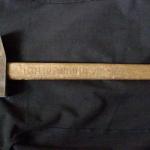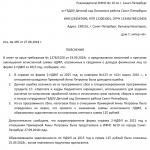The business plan was made for a universal mini-production of products from cast marble, artificial granite, onyx, and liquid stone. In such a mini-production you can make any products from cast stone. Production capacity is 400 kg of products per month. In mini production you can also make any products from fiberglass.
The production business plan was made from the position of minimal investments, taking into account independent work without hiring workers, simplified tax system 6%. You can view the full calculation with all the figures and connections in our office.
At a cost of about 200 thousand rubles. in a year you will receive a net profit of 1 million 800 thousand rubles.
As you can see, even with minimal investment you get a very decent profit.
Resources:
1. Rent of premises 30 sq. meters or selecting a small workshop of 30 square meters from existing space. meters,
2. Spending the investment amount, which will be used to pay, purchase tools for work, and pay expenses in the 1st month of work.
The investment amount can be reduced by: a) purchasing raw materials as needed (upon receipt of an order), b) working in your own premises, c) having your own tools.
Initial data for calculation:
- Product type: products made of cast stone and composites.
- Walkthrough
- Production equipment (tools, etc.): RUB 100,000.
- Amount of waste during production: 10%
- Number of cast stone products per 8-hour shift: 20 kg /this could be two sinks weighing 10 kg per day or one kitchen countertop weighing 100 kg per week/
- Income tax: simplified tax system 6%
- Production area: 30 m2
- Monthly rental cost for 1 m2 of area: 400 rubles.
- Cost of renting a Gazelle car: 500 rub./hour
- Cost of consumption of 1 kW/hour: 7 rubles.
- Packaging costs: RUB 2,000/month. /film, cardboard/
- Product sales price: 500 rub. for 1 kg (10-15 thousand rubles per 1 m 2)
Estimated characteristics of mini-production according to the business plan:
- Monthly revenue: 200,000 rub.
- Monthly net profit: RUB 144,488
- Net annual profit: RUB 1,733,864
- Break-even production point: 53 kg of products per month /i.e. make at least one kitchen countertop per month/
- Material costs per 1 kg of product: 52 rub.
- Total cost of 1 kg of product: 57 rub. (1.2-1.8 thousand rubles per 1 m 2)
- Return on sales: 76,86%
- Return on investment: 1 month
- Net cash flow at the end of the year: RUB 1,786,093
Net cash flow is the amount that remains at the end of the year after all payments (taxes, salaries, raw materials, etc.), and which can be disposed of at your discretion, i.e. This is profit in the everyday sense.
Calculations are current for 2019
MS Word Volume: 44 pages
Business plan
Download business plan
Reviews (15)
Reviews on the business plan for the production of artificial stone (15)
1 2 3 4 5Lada
Thanks for the business plan. The information is very interesting; many nuances are described that are not visible at first glance. The risks are calculated, which allows you to avoid unnecessary expenses.
Lada, thank you for your feedback. It’s great that the artificial stone production business plan turned out to be useful for you. You are right, calculating risks significantly increases the level of the project and reduces its final cost. We wish you good luck in developing your business.
Yuri
Great business plan. Everything is described in detail, but nothing superfluous. It's nice that you can find such high quality work online. Thank you.
Yuri, thanks for your response. The production of artificial stone is very popular today. It's time to take up vacant positions in this area of business. We wish you a successful start and stable development.
Alexander
This business plan is only good as an example for your own developments. I would not recommend using it as a ready-made document.
Alexander, thank you for your feedback. You are right, the presented business plan for the production of artificial stone is not a document ready for use. This is a typical business plan, the data for the calculations of which were taken as average. This is the basis for individual planning with a competent example of the necessary calculations. We wish you success in business.
A high-quality example of a business plan for opening the production of artificial stone with ready-made calculations will allow you to be convinced that this undertaking is within the power of enterprising people. Artificial stone is a product that is divided into two main types. These can be products made from colored concrete intended for cladding, or there can be various types of synthetic products that are created on the basis of a filler made from natural stone chips. Decorative stone can be used to decorate furniture; it is customary to decorate bar counters, table tops and drawers; this material is also used to decorate window sills.
A ready-made sample business plan for organizing the production of artificial marble will help you assess the possibilities of this business and choose the right direction. This material is widely used in interior decoration and for cladding buildings, so orders for its supply continue to increase. The document contains an example of special equipment, with the help of which it is possible to organize the production of artificial stone in the required volumes; it also provides a qualitative calculation of labor costs and determines the number and composition of personnel.
Having received a business plan for the production of decorative stone, you will understand where to begin the commissioning of this enterprise, and will also be able to bypass the existing obstacles in the implementation and establishment of this type of activity. You will be able to decide on the channels for supplying raw materials for future production, because artificial stone is made from cement, natural or artificial sand, gravel, with the obligatory addition of dyes. Also, this material can be specially aged to give the finish the nobility of antiquity. It’s up to you to decide; the main thing is to have a structured and clear document with calculations and expert conclusions at the first stage.
In stock 4 22In this article we will look at the production of flexible stone as a business: profitability, technology, necessary equipment and many other nuances. Despite the undemanding initial investment, this business can bring considerable profit.
- Demand
- Decor
- Flexible and cast stone
- Production technology
- Sales of products and advertising
- Business plan
Demand
In ancient times, people decorated the walls of houses using clay. Today, something like this has not been seen for several centuries - more interesting options have come to the market, including flexible marble or flexible stone. This material is a layer of sand several millimeters thick, fixed on a textile base.
Today this material is actively used, but the technology for its production itself is new, so there are few manufacturers of flexible stone. At the same time, a launched production line can bring considerable income to its owner. The cost of production is very high, and competition is minimal, so it can recoup the initial costs of producing flexible stone quite quickly.
Decor
Every business must be properly legally registered. In this context, opening an individual entrepreneur becomes the best option.
Also, for successful implementation, you will need to issue quality and compliance certificates.
Flexible and cast stone
Features of the production technology allow us to produce two main products simultaneously - cast and flexible stone. This approach allows you to work with a large segment of the consumer market, and this results in increased profits.
If at the initial stage there are problems with financing the project, it makes sense to focus on one material. As soon as the workshop reaches break-even, production should immediately be expanded.
It should be noted that working with soft marble is much easier. This material is new to the market; it is produced in the form of small tiles that are easily bent. Tiles are used for gluing various surfaces, from walls to small interior details. The flexible material is attractive due to its ease of installation and has already received well-deserved attention from consumers. It will be quite simple to recoup the project for its release.
Cast marble is a different matter. It has the potential to bring in more income than producing flexible stone at home, if only because the final product can be sold at a higher price. The material is actively used not only for finishing, but also in the production of sanitary ware.
Production technology
To create both flexible and cast marble, identical raw materials are used. Each enterprise uses its own recipe, so there are no ready-made solutions in this area. To calculate the components, you will need to use your own knowledge or, at most, invite a specialist.
Among the main materials required by flexible stone production technology, it is worth noting:
- marble chips or quartz sand as fillers;
- pebbles, quartz or colored sand for decoration;
- acrylic or polyester resin as a binder;
- artificial pigments for coloring.
In the production of soft stone, more accessible ingredients are used, such as quartz dust and marble sand. The final product is also made cheaper by the fact that it does not require resin. To give additional flexibility, polymer latex is used, which is applied to the base. By itself, it is quite cheap, so it is unnoticeable in the total cost.
In the case of cast marble, the production technology will look like this:
- All components are mixed according to the recipe.
- Prepare the molds by treating them with gelcoat. This step is used to ensure that the final product is more durable and shiny. In the case of a flexible stone, you will also need to stock up on a special base stone on which the mixture will be applied.
- The mixture is poured into the mold.
- The products are dried.
- The forms will be demolished.
- Finishing of the material is carried out - polishing, painting or coating with protective substances. Used in rare cases in factories.
The production of cast marble at home as a business is no fundamentally different from the industrial production of the material. The only difference is the lack of specialized equipment, which negatively affects the speed of work. In this case, as production grows, it is highly recommended to think about possible mechanization of the site.
Today, the market offers a wide selection of machines for producing flexible stone with your own hands. In order to start working with the casting method, you will need containers with dispensers, molds and gelcoat sprayers. It is also necessary to purchase a vibrating table and separate tables for cutting and packaging finished products.
The specific price of equipment depends on several parameters. Among the obvious are productivity, degree of mechanization and brand. The average cost is about 200 thousand rubles. At the same time, much more will be spent on purchasing forms for work. In order to provide customers with a sufficient range of products, more than a dozen of them will be needed.
The second option is to make the molds yourself. This will not only reduce costs, but also fulfill individual orders. The technology for making molds itself is quite simple and is based on creating a cast from plaster, onto which a polyurethane matrix is cast.
In the case of running an exclusively home business, the cost of equipment for the production of flexible stone is minimal. To get started, you only need containers, molds, brushes and mixing devices. This option, however, will not bring much income.
Separately, it should be noted that flexible stone production technology allows you to completely abandon the use of molds. In this case, a polymer-based composition is applied directly to the table, on top of which the base is laid.
The production of flexible stone and marble can generate significant profits even when the work is carried out on a minimal scale. The key point is to establish sales of finished products.
If we are talking about mass production, then it will be impossible to do without finding a wholesale buyer. However, it is impossible to satisfy the needs of such customers by working alone manually. Small construction stores and finishing teams should be considered as possible sales channels.
In addition, you can open or at least rent your own mini-store, which will conduct retail sales of goods. A good idea would be to launch a website with store capabilities. It will be possible not only to sell products, but also to accept orders for production.
However, the main advertisement of any product is its quality. If a buyer purchases a product that fully satisfies his needs, he will definitely come to you next time, and at the same time recommend the store to his friends, who will also become your clients.
Video: flexible stone - production technology.
Business plan
Before starting your own business, it is recommended to prepare a business plan. It includes all possible expenses, as well as potential income of the enterprise. Briefly, such a model can be presented in the form of a table:
Specific amounts vary significantly depending on production volumes and region.
If you find an error, please highlight a piece of text and click Ctrl+Enter.
Organizing a business in the construction industry is an excellent option for beginners. And if you implement a project that does not require large investments, the mini-enterprise will pay for itself very quickly. The main thing here is to choose the “right” niche. Are you looking for an interesting idea right now? Then pay attention to the production of flexible and cast marble. The technology will not seem complicated even to those who are far from the construction industry, and equipment for the production of cast and flexible marble is inexpensive.
Our business assessment:
- Starting investments - from 50,000 rubles.
- Market saturation is low.
Flexible and cast marble are artificial finishing materials characterized by high strength, durability and resistance to negative external factors. Each type of product is manufactured using a similar technology, only the composition of the working mixture varies.
Opening a marble production business in Russia that brings consistently high profits is not difficult, given that competition in the domestic market is minimal. A fairly limited number of companies are involved in the production of the material. Another advantage of this type of activity will be the high demand for products among consumers - preference is increasingly being given to artificial analogues of marble.
Flexible and cast marble: which is more profitable to produce?
A business idea for the production of cast and flexible marble involves the production of both types of products. This will significantly increase the entrepreneur’s final profit, since it will allow him to cover a significant part of the consumer market.
If there is a lack of funding, an entrepreneur can start producing one specific material. But over time, when the workshop reaches the break-even point, it makes sense to expand its activities.
The technology for producing flexible marble is somewhat simpler. This is a new material on the market, produced in the form of small, highly flexible tiles. These products can be used to cover any surface – from walls to interior items. Flexible marble is easy to install, which is what earns consumer recognition. By releasing it, you enlist the support of a wide range of potential buyers, and with a proper advertising campaign, you will very soon see the project pay off.
But the production of products from cast marble can bring an entrepreneur more impressive income, since the final product costs much more than flexible material. Decorative items, finishing materials, and plumbing fixtures (baths and sinks) are made from cast marble. In terms of technical characteristics, it is in no way inferior to products made from natural raw materials. In terms of strength and durability, flexible stone cannot be compared with it.
It is better to immediately buy equipment for the production of cast and flexible marble, having mastered 2 technologies.
Technologies for manufacturing artificial marble
For the production of cast and flexible marble, almost the same raw materials are used. Each enterprise introduces its own mixture recipe - you will not find the exact quantitative composition. Either calculate the components used yourself, or involve specialists.
Let us designate the main materials necessary for the production of products:
- Binding elements are polyester or acrylic resin.
- Fillers - quartz sand, natural marble chips.
- Decorating elements - colored sand, quartz or pebbles.
- Coloring elements are artificial pigments.
To obtain flexible material, you can purchase cheaper fillers - marble sand and quartz dust. Resin may also not be required, which significantly reduces the cost of the final product. And in order for the material to be endowed with flexibility, its base is covered with a special compound - polymer latex. The price of this component will not significantly affect the cost of products.
The production technology of cast marble is practically no different from the process of manufacturing flexible material. The chain of actions is as follows:
- Mixing components according to the recipe.
- Preparation of forms. When making cast marble, the mold is pre-treated with gelcoat - it gives the final product gloss and additional strength. A flexible material requires a special base - it is on this that the composite mixture will be applied.
- Pouring the mixture into molds.
- Drying products.
- Form removal.
- Final processing of the received material. Products can be polished, painted, coated with protective compounds. This stage is not always used.
Making cast marble with your own hands is no different from producing the material in a production environment. But in this case, all operations will be carried out without the participation of special equipment, which will significantly slow down the process. Therefore, having planned serial production of products, it is better to seriously think about mechanizing your workplace.
What equipment is needed for the production of flexible and cast marble
Machines for producing artificial marble are presented in a wide variety on the market - this will make the choice much easier for the entrepreneur. The production of marble by casting will require the following set of equipment and inventory:
- containers for components with dispensers,
- concrete mixer,
- shapes,
- gelcoat sprayer,
- vibrating table,
- tables for cutting and packaging finished products.
The price of equipment for the production of cast marble depends on the brand, productivity and degree of automation. An “average” set of devices will cost an entrepreneur at least 200,000 rubles. The main cost item is forms. They should be purchased in sufficient quantities to provide customers with a wide range of products. But this is only in the case of mass production, since to produce original products you will need to make molds yourself, taking into account the wishes of the buyer. The technique for making molds is simple - a cast is made from wood or plaster, and a polyurethane matrix is cast on its basis.
Equipment costs are significantly reduced when running a home business. Here you only need simple equipment - brushes, molds, stirrers, containers.
When producing flexible stone, molds may not be used. In this case, the base is laid on the table - here the polymer composition is applied to it. But for a full range of products, it is better to equip the workshop to the maximum!
Room for organizing the production process
The cast marble production line does not take up much space. The workshop, warehouses and office premises can be located on an area of 70 m2. The premises must have electricity, running water, heating, and sewerage.
Since the production of products based on artificial marble does not release harmful substances into the air, the entrepreneur will not need to obtain permits from sanitary and fire services.
And you can organize a home business even in a garage or on a country plot - great savings on capital costs.
Sales plan for finished products
Even the production of cast marble at home can bring a stable profit to the master. The main thing is to organize full sales of manufactured products.
When mass producing material, it is worth looking for wholesale buyers. But working manually, you will not satisfy customer requirements for shipments of large quantities of goods. Construction companies and shops, repair teams will serve as wholesale buyers. To organize retail sales of goods, you can open or rent a small store or space in the construction market. A good option would be to launch your own website, where you can not only sell products, but also accept private orders.
Whatever path you take to develop your business, think over a marketing strategy - even a small business needs advertising, otherwise sales will not come at all. Use a variety of platforms to advertise your products - advertisements in newspapers and the Internet, posting information at bus stops and on entrance doors, radio and TV.
How profitable is the planned business?
The costs of producing cast artificial marble and its flexible analogues, as the practice of novice entrepreneurs shows, pays off very quickly. If the enterprise is provided with orders, and all manufactured products are shipped to customers, the workshop will reach the break-even point and begin to generate consistently high profits already in the current construction season.
Launching a full-fledged workshop for the production of cast marble will require an investment of 300,000 rubles. Flexible marble is cheaper to produce - it will take about 200,000 rubles to organize the business. You can plan a home business without spending even 50,000 rubles.
If you have already completed training in marble production and purchased the necessary equipment, calculate the possible profit. The profitability of the enterprise will depend on several factors - the selling price of the product, the raw materials used, and the power of the equipment. Products made from cast marble are more profitable to sell. The minimum cost of material is 2000 rubles/m2. The price will be significantly higher if you receive an order for the manufacture of complex products - up to 10,000 rubles/m2. At the same time, the cost of production is at least 50% lower than the selling price! Flexible marble is cheaper - from 500 rubles/m2.
A medium-sized enterprise with 3-5 workers on staff can supply the market with up to 500 m2 of cast marble. Revenue from full sales of products will be 1,000,000 rubles. The production of flexible marble is faster - in a month you can earn up to 1,500,000 rubles. These are excellent profitability indicators, given the simplicity of the technology and relatively inexpensive equipment.
Cast marble is currently very popular. It is used for making sanitary ware, decoration, etc. We can say that it is a great idea for a new entrepreneur to produce artificial marble. But there are a few details worth paying attention to. Firstly, the equipment for the production of artificial marble that you need to buy. Let's talk about this.
What does the artificial marble production line consist of?
The first step is to install the vibrating table. Its main purpose is the processing of concrete elements and reinforced concrete products, so we cannot do without it. It is worth drawing your attention to the fact that this composite material consists of polyester resin, as well as a mineral-based filler.
In principle, cement-sand mixtures are quite strong and have many advantages over polymer concrete. But let's continue to look at the equipment. As noted above, we need a vibrating table, preferably a forming one, it will allow us to give a certain shape to our workpiece.
You also need a cup sprayer and a mixer for mixing the solution. Of course, we will need forms, we need to think about this in advance. It all depends on why, or more precisely, for what field of activity we produce marble. Well, now in more detail about how the manufacturing process itself goes.
Artificial marble technology
A distinctive feature of cast stone is that you can get absolutely any color. This is achieved by adding various pigments. The binding element is polyester resin; it is this component that affects the strength of the material. So, it all starts with us finding the raw materials. As a rule, these are sand, cement, pebbles (used as filler), water, dyes and 1% plasticizer.
We sift the material on a vibrating table, and then use cement, sand and pebbles to make a solution in a concrete mixer. Before this, we prepare the forms; they must be clean and dry. A dye is added to the mixture; it is better if there are several pigments. It is important to achieve uniformity of the material, which is why the entire process is accompanied by constant stirring. At the final stage, the product is poured into a mold and sits there for about 10 hours, after which it can be removed. As you can see, the equipment for the production of artificial marble is quite simple.
About the features of the material
It was already noted above that artificial marble has many advantages over polymer concrete. The material does not burn and does not conduct electricity or heat. This allows it to be used in places with elevated temperatures (heating radiators, stoves, fireplaces), etc.
Such marble practically does not interact with chemical elements such as alkali, gasoline, acetone, etc. Any kind of contamination is quite easy to remove, so it is suitable for use in public toilets and similar places.
Another important indicator is the durability and environmental friendliness of cast stone. The examinations showed that even when heated, the material does not emit harmful substances. It is thanks to its unique qualities that it is widely used in all areas, especially since the equipment for the production of artificial marble is not complicated, and its price is low.
Some more useful information
It is worth saying a few words that in some cases, after the material has hardened and you have taken it out of the mold, it will require additional mechanical processing. It consists of polishing and smoothing the edges. In principle, this is necessary if the casting stone has an important purpose and must have an ideal shape.
In some cases it makes sense to use chemical additives, for example to increase mechanical resistance. If the operating conditions of the material require it. It is advisable that your workshop has several shifts of employees; the area for each team should be about 20-25 square meters.
Don't forget to buy pallets on which you will place the finished material. It is advisable to carry out delivery to the warehouse using a railway or conveyor (conveyor). The second case is only suitable if the warehouse is nearby.

Artificial marble is a good alternative to natural stone, the cost of which not everyone can afford. Making marble from concrete allows you to obtain a product that is not inferior in characteristics to natural material, but at the same time has a more affordable price. Organization of production does not require large financial investments and special knowledge from the entrepreneur.
Our business assessment:
- Starting investments - from 50,000 rubles. and higher
- Market saturation is average.
- The difficulty of starting a business is 5/10.
Business benefits
Producing artificial marble from concrete at home has many advantages:
- Consistently high demand for products.
- Low level of competition.
- Low costs at the opening stage.
- No rent.
- You don’t need to hire employees, you can do it yourself.
- Simple technological process.
- The ratio of cost and selling price of the finished product.
- High profitability - up to 300%.
Any person not related to construction and production of building materials can open an enterprise whose activity is the production of artificial marble from concrete.
But before making marble from concrete with your own hands, it is worth considering in detail all aspects of such production: discovery stages, risks, manufacturing technology, financial costs.
The process of making artificial stone
Many people think that it is very difficult to make a good imitation of natural material.
But the technology for producing artificial marble from concrete is simple and consists of several stages:
- Mixing components according to a standard recipe for preparing concrete mortar.
- Adding dyes and polyester resins to the mixture, on which the basic qualities of the material depend.
- Pouring the solution into prepared molds.
- Compaction on a vibrating table.
Next, you need to wait until the mixture has completely hardened, and then remove the finished stone from the molds. The resulting product, subject to production standards and requirements, will meet established standards and have high quality characteristics.
Equipment for the production of artificial material
Vibrating table for production
Buying equipment for the production of artificial marble is not difficult: setting up a workshop will not require large expenses. The machines used in the manufacturing process are cheap and easy to operate.
Rotary concrete mixer
The technology for making marble from concrete involves the use of the following devices:
- special molds for the production of artificial marble - from 1000 rubles. a piece;
- vibrating table - from 30,000 rubles;
- mixer for mixing the solution (minimum volume 250 l) - from RUB 25,000.
The minimum number of molds required to create an assortment is 10 pieces. The total price of equipment for making marble from concrete is 65,000 rubles.
Nuances of artificial stone production
If you don’t have enough money, you can refuse to buy a concrete mixer. The solution can be mixed by hand. Vibrating table and molds are the main equipment, without which it is impossible to start the production of artificial stone. At the first stage, you can do all the work yourself. With an increase in the customer base and an increase in the volume of manufactured products, it will be necessary to hire one or two partners.
Before making marbled concrete, you need to decide on the type of product to be produced. It is best to immediately buy molds for making tiles, borders, paving stones, balusters and other things. It should be remembered that the larger the assortment offered to the buyer, the higher the profitability of the enterprise. Moreover, it is very convenient to buy tiles, paving stones, and borders in one place.
Examples of finished products
You can try to make exclusive forms yourself, because their cost is much higher than conventional devices: from 23,000 rubles. for 1 piece. But you can accept orders for the production of original products, and buy molds only after prepayment.
By the way, the best option would be to purchase polyurethane molds. Their advantages are high quality, affordable cost and durability.
The raw materials for making marble from concrete are the following materials: sand, M400 cement, dye (pigment), polyester resins (plasticizer).
Calculation of profits from the production of artificial material
Every month you can produce about 1000 m2 of artificial marble, which costs on the market from 370 rubles. per m2 and above. The price depends on the thickness of the product, its appearance and workmanship. That is, the minimum revenue will be about 370,000 rubles. The costs will be about 100,000 rubles. per month. An entrepreneur can earn more than 250,000 rubles. per month. All investments will pay off within 30-50 days after the start of production.
The payback and profitability of an enterprise depends on the competent organization of sales of finished products. You can sell marble through specialized retail outlets or online stores. Advertising in the media will allow you to work to order. But the main point of attracting buyers and expanding the client base is the high quality of the products offered and attractive prices.
Production of artificial cast and flexible marble
Entrepreneurs often rely on the production of artificial marble, because in terms of external characteristics it is simply indistinguishable from natural stone, but its cost is much more affordable than natural material. The main raw material for this business is concrete, and organizing a workshop for the production of artificial marble does not require large financial investments or special knowledge and skills from the businessman.

Today in construction, namely when performing finishing work, marble or granite is often used, but this material is not cheap. A good alternative in this case is to replace natural stone with artificial stone, which is made from concrete and therefore costs an order of magnitude less. Artificial marble is used to equip countertops, sinks, slabs for steps, bar counters, etc., and it is easy to make it yourself if you have the appropriate mold to cast the desired part.
The resulting parts are distinguished by the hardness that is inherent in products made from natural marble, and at the same time they are easy to process, allowing you to hone the final product to the desired shape. As a result, the product is not only not inferior to natural material, but in terms of durability in use it is even better. Another positive side of artificial material is its pleasant warmth, while natural marble is rather cold.
Production of artificial marble - composition and characteristics of artificial alloy
The technology is based on concrete and polyester resin as a raw material, which gives the material the strength of stone, and additional fillers and pigments will give the desired color and noble stains. Using special technology, you can get exactly the same veins and spots as on a cut of natural stone. By honing the production technology, you can achieve different colors and textures of the material as much as possible according to external data, bringing it closer to marble.
The features of artificial marble include its fire safety, complete non-conductivity of heat and electric current, so the alloy is often used as a finish for stoves and electrical appliances, without worrying that high temperatures can lead to damage to the finish or, even worse, to a fire.
When interacting with household chemicals, alkalis, acids and solvents, the material remains unchanged and no reaction is observed. The structure of the alloy is solid, which is why it is resistant to impacts. Based on these characteristics, the best material for a kitchen table top will be an artificial alloy, which can be made in any color that matches the color characteristics of the kitchen interior.
Products made from artificial marble are easy to care for; they do not delaminate or crack, while they are resistant to stains and can be easily cleaned with a soft sponge and soap solution from any stains. Cast marble is an environmentally friendly material because even when exposed to high temperatures it does not emit toxic substances.
Such qualities of artificial marble determine its widespread use in the construction industry, which is why the production of artificial marble at home will be a profitable investment.
Start-up capital and business advantages
To open a business producing artificial marble, an entrepreneur does not have to understand the construction industry, he just needs to have start-up capital and the desire to work. But before you decide to open a workshop at home, it is worth studying in detail all aspects of such a business: the nuances of opening production, possible risks, material manufacturing technology, financing.
At the initial stage, the entrepreneur will need to invest at least 50 thousand rubles in the implementation of the idea. The advantages of producing artificial marble at home include: high demand for the product, minimal competition, relatively small financial investments, no rent for premises, ease of manufacturing technology and high business profitability, which reaches 300%.
Production technology
Since the extraction of natural stone is a labor-intensive and complex process and this is reflected in its price, while the artificial alloy can be easily made even at home, and in terms of characteristics and appearance is in no way inferior to natural marble. To start production, you only need raw materials and molds, and there’s nothing to say about savings. When producing an artificial material, it becomes possible to control the entire process, namely the pattern, color, thickness of the workpiece, the presence of veins and its texture. If production improves, then it can be made your main type of income, because the raw materials are cheap, and artificial marble ultimately comes in a wide variety of shapes and types.
Many people are afraid to implement the production of artificial marble as a business at home, because they think that the technology for making a material that imitates natural stone is very complicated, but in fact this is not the case. The production technology consists of the following stages: mixing the concrete solution according to a standard recipe, adding polyester resin and dyes that affect the appearance of the product and its characteristics, filling the molds with the solution, getting rid of possible air pockets and compacting the solution using a vibrating table.
After the mixture in the mold has hardened, the product can be pulled out. If you strictly follow the manufacturing technology, the artificial stone will meet all standards and the product will be of excellent quality.
Necessary equipment to start
Equipment for the production of artificial marble is cheap and is not difficult to operate. To organize a workshop, you will need to purchase the following equipment: molds for mortar of various shapes (1000 rubles per unit), a rotary concrete mixer with a bowl volume of at least 250 liters (from 25 thousand rubles) and a vibrating table for compacting the mortar (from 30 thousand rubles). In order to set up production, it is advisable to purchase at least a dozen different forms. In total, to start you will need an initial capital of 65 thousand rubles. If there is no such amount, then you can refuse to purchase a concrete mixer; at the initial stage of business development, you can mix it manually. The main thing is to purchase a vibrating table and molds. Without this equipment, it is impossible to produce high-quality artificial marble. At the initial stage of business development, you can perform all the technology yourself, but as the business develops and the number of clients increases, you will have to hire one or more assistants.
At the initial stage of implementing the idea of artificial marble production, the business plan should contain not only cost items and calculation of possible profits, but also describe the type of product that will be produced. It is recommended to immediately purchase molds for casting borders, paving and decorative tiles, etc. Remember, the more diverse the product range, the more customers there will be and the higher the sales income. It is more convenient for the buyer to buy curbs, paving stones, and tiles from one manufacturer than to travel and look for all the necessary elements from different sellers.
Technology for producing an analogue of natural marble
The production of cast marble requires the manufacturer to have a separate spacious room, as he will have to work with chemicals and large molds. You also need a warehouse type place to store finished products.
At the initial stage, you need to purchase the following raw materials: river sand, cement, dyes, small pebbles, plasticizer and cellophane. The molds must be washed and dried before pouring the mixture. After which the mixture is prepared by mixing cement, sand and pebbles, after which a dye is added, which leads to the formation of stains and veins like natural stone. The addition of dye is carried out according to the principle that the more uniform the application, the more similar it will be to natural stone.
After this, a plasticizer and 80% water are added to the composition and intensively kneaded until a plastic mass is formed, after which the rest of the water is added. The mixture is kneaded until it becomes completely homogeneous. The quality of the final product depends on this moment.
After the mixture is ready, it is poured into molds, getting rid of the remaining mixture on the edges of the mold, after which it is covered with polyethylene and left until completely hardened (approximately 10-12 hours). When the product has hardened, it is carefully removed from the mold and after resting it is ready for sale and further use.
Conclusion
As you can see, everything is extremely simple here. There are no complex chemical or physical processes. It is enough to follow all the rules, buy the necessary equipment for the production of artificial marble, and you will be able to produce cast stone.
Do not forget that the product must be truly high quality and uniform. But the main goal is to imitate natural stone, because this is what artificial marble is designed for. In principle, this is where we can end our review. Despite the simplicity of the basic work, do not forget that the production of artificial marble is a process that requires qualifications from your employees, as well as attention at all stages of production.
We welcome your comments!
The production and sale of construction and finishing materials has always been considered a profitable area for starting a business. The main difficulty is to choose a product that will be in demand among buyers, and to ensure that the equipment of the production workshop is “reasonable” for a novice entrepreneur.
One of these interesting and new areas is the production of flexible stone; a more expensive alternative in terms of consumables is the production of cast marble. Both products are made from marble or quartz chips bonded with polymerizing agents.
|
|
Consumer benefits of flexible and cast marble.
Flexible stone is the know-how of the modern construction market; it is a flexible coating 3 mm thick based on marble chips and acrylic. The coating is lightweight, adheres to any type of straight and curved surfaces, and is completely resistant to precipitation. Its weight does not exceed 3-4 kg per 1 square meter. meter.
You can cover both internal interior elements with flexible marble and use it for exterior decoration of houses, including finishing the surface of the foundation. The color scheme is not limited, the designs are created by the master, and their variations can also be any.
Cast marble or polymer concrete has excellent consumer characteristics. The use of polymer concrete is very wide, from the manufacture of technical components, such as electrolytic baths and drainage systems, to the production of tiles for flooring, foundations, and building blocks.
With a fairly close imitation of the texture of natural marble, cast marble does not have the disadvantages of natural materials. First of all, polymer concrete is highly resistant to stains and is easy to repair. Artificial cast marble is environmentally neutral and is used to make decorations for furniture, sanitary ware, and cladding interior and exterior surfaces.
In addition, polymer concrete can imitate in appearance tinted quartz, marble pebbles, relic sands, malachite, onyx, and jasper. Used for making decor.
Features of production technology.
Both of the above technologies for the production of cast and flexible marble are characterized by low-cost technology and very high profitability. To organize a small workshop, you will need a room with an area of no more than 20 square meters. meters, for mass production - about 100 sq. meters. Investments in equipment are available to almost any person, and the cost of products will actually be determined by the cost of consumables.
This is one of the inexpensive and advanced technologies, as a result of which it is possible to produce products for which the demand in the market significantly exceeds the supply with very high profitability. So the choice towards the production of cast and flexible marble as a business direction is interesting in the long term.
Note that specialized equipment is not required for the production of single products or small batches, but can be offered by a number of manufacturers for mass production.
In the production of cast marble, a mixer is used to mix the potting mixture of filler with a catalyst and polymer resin, brushes and sprayers. The technology compares favorably with its low cost compared to the technology for manufacturing artificial stone, since it does not require the preparation of a potting mixture in rarefied air conditions.
Rental, purchase of equipment and production set-up.
For manual production you will need a workshop with an area of 50 square meters. meters to accommodate the production of flexible and cast marble. Renting the premises will cost $50-100 per month.
Equipment for making flexible marble will cost a total of $1,500, with most of this amount going to purchase 8-9 mm OSB boards to make tables for drying the finished product. There are special video master classes that cover in detail the issue of making flexible marble.
You can start production within 1 week. It is easier to evaluate the payback using an example: complete cladding of the facade of two houses with an area of about 150 sq. m. metro will fully recoup all production costs.
The cost of a package of equipment and molds for the production of cast marble will cost $500-1500, depending on the manufacturer. The composite material is made from filler, polyester resin and gelcoat. Companies that supply production supplies and make molds provide free training to customers.
Staff.
To operate such a production, 4-8 workers will be required with an average salary of $500 per month. Personnel costs, including an accountant, will be about $4,500. In the first months of work, the number of workers may not exceed 2-3 people.
Sales plan.
The average price of flexible marble on the market is $10 per square meter. meter. With two people working, 142 square meters need to be produced. m to cover wages. This volume can be made in about 1 week. Accordingly, the net income from producing flexible marble by hand will be $2000-3000 per month.
For example, an artificial marble countertop costs about $80 per square meter. meter, cost 20-30% of the selling price. Accordingly, $60 per sq. meter makes up the total income. To recoup the work of two workers, you will need to make a little more than 15 square meters. meters of countertops. Such orders can be placed by furniture companies producing kitchens that have a regular clientele.
Advertise products through construction portals. It is recommended to cooperate with furniture manufacturing companies. Use the Internet and your own website as a communication channel. Advertising costs can be $100-500.
Total profitability.
The total profitability for the production of flexible and cast marble is about 300%. When completing individual orders, payback can be achieved in 3-4 months; when working with regular customers, payback is achieved in 2 months.


















